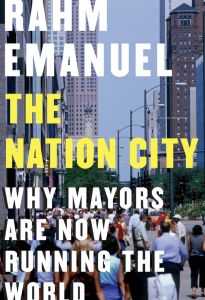Political progress has become increasingly rare in America, allowing city and state governments to provide hope for the future.
The federal government has garnered much criticism by Americans over time, especially over the past few decades. Congress is indifferent to the struggles that the average American faces today. Meanwhile, local governments have remained the heart and soul of this country.

In every major city, universities are educating millions of young citizens and infrastructure continues to improve. Public transportation, such as trains, taxis and subways, are widely used. Public parks, sports stadiums and concert venues bring people downtown for live entertainment. Environmental benefits are derived from public transportation and maintenance of public parks/gardens. Diversity is celebrated, not scorned. Pride parades, art museums, cultural centers and civil rights memorials line the streets. Immigration is welcomed, many serving as sanctuary cities – cities where local laws protect undocumented immigrants from deportation despite federal policies.
Equal opportunity, the distinct creed of this country, is thriving in cities more than it ever has before. The main reason why cities have not lost their sense of community and progressivism? The entire population faces the same day-to-day issues and interacts with each other consistently. Everyone understands and respects each other’s differences. Most importantly, there is no distance between public servants and the people who elected them.
America was founded on a separation of powers between one strong, central government and multiple state governments. Throughout history, national programs and federal policies have complimented each state’s right to make its own progress on daily issues. Federalism, as it should be, is the principle of our government.
I am not posing an alternative form of government, or stating that the Founding Fathers were wrong in their beliefs. I am suggesting that our unique and long-sustained form of governance has to be embraced now more than ever. The U.S. not only remains a separation of powers, but has transformed into a separation of reality.

Former mayor of Chicago, Rahm Emanuel, recently published his second book, “The Nation City: Why Mayors Are Now Running the World.” His book addresses the dysfunction in the federal government due to partisan judges on U.S. courts, the influence special interests have on Congress and gerrymandering – manipulating boundaries of a district to favor a political party during an election.
Emanuel raises a good point in his work, stating that conspiracy theories/stereotypes are spread about national politicians, but not local ones. He accredits having immunity to false statements to the fact that local politicians are just simply too well-known for citizens to know anything other than the truth. This relationship will allow cities to “drive the economic, cultural and intellectual future” of America.
Where the federal government has failed to connect with reality, local governments have continued to improve the lives of their people. Locals participate in town halls, some of which air on CNN and Fox News. Complex issues surrounding law enforcement have been dealt with locally through community policing – assigning police officers to specific areas of a community to build relationships with locals and decrease bias. This is a prime example of how non-partisan politics can exist in tight-knit communities to create a deeper understanding between people.
When the current administration pulled out of the Paris Climate Agreement in 2017, the Chicago Climate Conference brought mayors all over America together as a commitment to take city-level actions and combat climate change. Following the travel ban earlier that year, and the separation of families at the Southern border, many mayors acted to ensure their sanctuary cities would remain protected.
Just recently on March 30, due to the coronavirus spreading across America, local leaders of the DMV area stepped in where the federal government would not. Washington D.C. Mayor Muriel Bowser (D), Maryland Governor Larry Hogan (R) and Virginia Governor Ralph Northam (D) issued a stay-at-home order for all three areas. This move unified the DMV in the fight against the deadly virus. While the federal government currently has states attempting to out-bid each other for ventilators, New York Governor Andrew Cuomo has held daily press conferences to assure New Yorkers these trying times are ultimately temporary. Meanwhile, California Governor Gavin Newsom has been able to stop the spread of the virus tremendously, because of his early action.
These actions taken by local governments validate the fact that our ability to communicate and pass common-sense laws is not dead. Our democracy is highly-functioning in each part of the U.S. The disconnect lies on the federal level where many problems have yet to be resolved. America is witnessing, now more than ever, the true power its Founding Fathers believed in. We need to encourage our federal government to communicate daily with states. The president should meet with each governor monthly to discuss the state’s affairs, and mayors of heavily populated cities should have monthly phone calls with the president. Senators and representatives should participate in town halls every few months.
Some public servants in D.C. claim to represent people living on the complete opposite side of the country. The federal government will get back to improving the quality of life for Americans when members of Congress remember the unique set of challenges their own people face back home. Our strength does not come from being governed by a national government, or cutting off all communication with its members. Our democracy’s strength comes from our belief in the ability to help each other combat problems that our own individual communities face. Washington D.C. is just a place people intended to send their representatives to do so.



